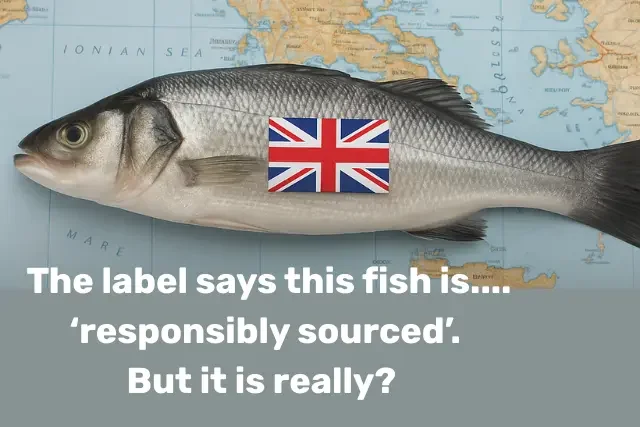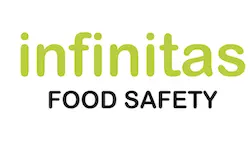Food Hygiene Rating Scheme (FHRS) Appeals – What Is The Problem? (PART 1)
The FHRS appeals system is a safeguard to ensure fairness with the Food Hygiene Rating Scheme. But the appeals system has a hidden problem. Find out!

Last week, wildlife presenter Chris Packham called out the big supermarkets over their unethical and misleading information on fish labels.
According to a recent investigation by the Guardian and DeSmog, sea bass and sea bream sold in UK supermarkets is linked to overfishing, food insecurity and unemployment in Senegal, West Africa.
Yet, this fish, sold by Waitrose, Co-op, Lidl, Aldi, and Asda, is labelled as “responsibly sourced”. And the consumer has no idea of its darker side.
Chris Packham labelled the supermarkets irresponsible and called it a “dereliction of duty.” Because when you can’t trust the label, and you can’t trust the seller… who can you trust?
This isn’t just about one mislabelled fish — it’s about the integrity of our entire food system. When big retailers play irresponsibly or immorally with labelling, they’re undermining several crucial factors:
Trust. Every unethical label chips away at consumer confidence in what we eat. If the supermarkets are misleading the public about sea bass or sea bream, what else are they hiding?
Sustainability. You think you’re making a responsible choice when you buy ”responsibly sourced” fish. But you might unknowingly be supporting unethical practices you’d never knowingly back. And this is not your fault.
Hazel Healy from DeSmog reveals how UK supermarket sea bass connected to overfishing in Senegal is exposing the hidden supply chain truth that most consumers never get to see.
Your wallet. You might be paying premium prices for what you believe is quality, local produce — but you may be getting something entirely different.
So, if you can’t trust the big supermarkets – who can you trust when buying fish? Try your local fishmonger.
Walk into your local quality fishmonger, and you should get straight answers. Your fishmonger will likely tell you where the fish came from, when it was landed, whether it’s wild or farmed, what’s freshest today, and what offers the best value for your money.
They should know the boats that brought it in. Many buy directly from the quayside. There’s no corporate middleman obscuring the truth with clever packaging and marketing speak.
More importantly, they talk to you face-to-face and want you to come back. That relationship creates trust, and accountability. And no supermarket barcode can match that. A small independent business, like a fishmonger, depends on customer trust. They won’t want to risk their reputation with misleading labelling.
Behind the scenes, a good fishmonger will be working hard to maintain food safety standards — keeping detailed records, managing temperatures correctly, and ensuring full traceability. Some even use systems like the Fishmonger Compliance Kit to stay ahead of regulations (full disclosure: our small business helps them with that).
Remember then, that supermarket fish might look like a bargain. But it may come with hidden costs. You’ll be paying for excessive packaging that ends up in landfill, and transport emissions from shipping fish halfway around the world. You may be paying for reduced safety and quality because the fish has been sitting around longer than was needed.
Your local fishmonger meanwhile, can portion fish to order, offer cooking advice that actually works. He/she can also introduce you to cheaper local species that taste better than the expensive imports everyone thinks they want.
Next time you’re buying fish anywhere, ask these questions:
If you get vague answers, corporate scripts, or the dreaded “I don’t know,” it’s time to find someone who actually knows their product.
This sea bass investigation reveals a much wider issue. We’re seeing the same patterns across meat, dairy, and eggs. Glossy packaging and clever marketing mask a growing disconnect between what we’re told and what’s actually true.
But here’s the encouraging part: independent businesses like your local fishmonger are still getting it right. They welcome questions because they’re proud of their products. They’re the first to call out industry nonsense because their reputation depends on honesty.
In a world of corporate doublespeak and regulatory loopholes, that kind of straightforward dealing is worth supporting.
Next time you walk past a fishmonger, don’t just keep walking. Go in. Ask what’s fresh, what’s local, what they’d recommend for dinner tonight.
You’ll get better fish, better advice, and the satisfaction of supporting someone who treats food — and customers — with respect.
And if you’re a fishmonger reading this, wondering how to make sure your back-of-house systems match the quality of your customer service, get in touch. We’ve developed a fishmonger compliance kit that will help you pass your food hygiene inspections with flying colours. It will help you achieve a 5 Food Hygiene Rating to build even stronger customer trust.
Because in the end, food safety and transparency aren’t just good business — they’re the foundation of everything you do.
The FHRS appeals system is a safeguard to ensure fairness with the Food Hygiene Rating Scheme. But the appeals system has a hidden problem. Find out!
Got a Low Food Hygiene Rating? Get your Emergency Response Kit to protect your reputation when your hygiene rating goes public!
Caterers – Learn lessons from the 2024 e.coli outbreak. Rethink your food safety by using the E. coli Guidance Fact sheet

The Food Law Code of Practice has been revised for England & Northern Ireland. It provides a new approach to food hygiene inspections and includes a new scoring system for Food Hygiene Ratings. It will impact food businesses and the frequency of how often food businesses are inspected.

Complying with food safety law is complex. Small food businesses commonly lack someone on their team with experience in food safety. Learn why your business could benefit from using a food safety consultant.
